What's more important for your business than having a website? While we wait for you to search for an answer to that question, we'll save you some time by letting you know there is nothing. The right website is a guaranteed way to boost your online presence - something that all businesses cannot afford to miss out on.
If you are not a business owner but would like a website to grow your personal brand, start a blog or even showcase the professional pictures you took over the weekend, finding the best website builder should be the only thing on your mind.
When you marry the best website builder with the best web hosting service, the dynamic duo is essential for an increase in online business success in the digital space. The good thing is, there is such a huge variety of builders available that there is bound to be one that can bring your online vision to life.
The first step to choosing the right website builder comes from you – do you have a plan for what you want your website to look like? Is it an e-commerce store, some other type of business or simply a way to publicize your hobby?
To chose the best website builder, you will need to take into account all aspects of the brand and what it offers including its features, its value for money, how much support is offered to you, and how easy it is to use.
Whatever your online strategy and whatever your budget (we've got some exclusive voucher codes as well), we’ve put together a comprehensive shortlist of the best website builder services in the world right now, out of the 50+ that we have reviewed with more to come, as of June 2021.
Top three website builders in 2021

1. Wix - a top-notch website builder
Wix is top dog when it comes to free website builders, but it also offers some powerful paid plans. These start from as little as $8.50 per month for the Combo plan, which gets you 3GB of storage space, a free domain and free SSL certificate.

2. Web.com - a serious, high-quality site builder
Web.com offers a website builder which is very easy-to-use and ideal for novices, allowing anyone to get their site up swiftly. With top notch support and rock bottom prices, it is great for those looking for an affordable yet capable partner. It's 50% off the first month, starting at $1.95.

3. Gator - a superb value website builder service
Gator Website Builder from HostGator offers a superbly cheap Starter package which comes with free hosting and a domain name included, plus a free SSL certificate: all with 55% off meaning prices start from just $3.46 per month.
- Check out our brand new domain report that looks at the realm of domain names
These are the best website builders of 2021

Wix owns the title of best website builder overall due to the way that it combines ease of use and great design flexibility. It offers users a range of plans, and a drag-and-drop editor that allows them to tweak and customize every aspect of their site without requiring them to be a coding expert.
Today, Wix is one of the most popular online website builders in the world with more than 200 million users (according to their February 2021 report) across 190 countries and it is easy to see why.
One of Wix’s biggest strengths is the breadth of features it offers. It comes with more than 500 industry-specific themes, so whether you need a website to advertise your new café or want a place to show off your photography skills, it’s easy to create a website that’s right for you.
At the start of your Wix journey, you’ll be given the choice of two options: WixADI or WixEditor. WixADI uses answers to a few short questions to design the site for you – great if you’re indecisive, but not so good if you want total control. WixEditor, on the other hand, is a drag-and-drop process that will take longer but lets you create a website that’s completely customized for your needs.
In terms of downsides, Wix doesn’t have many. The fact that it imposes data limitations for each of its plan tiers could be an issue, particularly for sites which have a lot of visual content. Also, some users have complained that its tech support is somewhat lacking.
Nevertheless, its smart design, brilliant SEO and first-rate marketing tools mean that Wix is our number one pick for anyone who needs a website builder. There is a free version available (more on that later), as well as Business Basic, Unlimited and VIP pricing plans. Whichever one you opt for, all Wix premium plans come with a free two-week money-back guarantee, so there’s no risk involved.
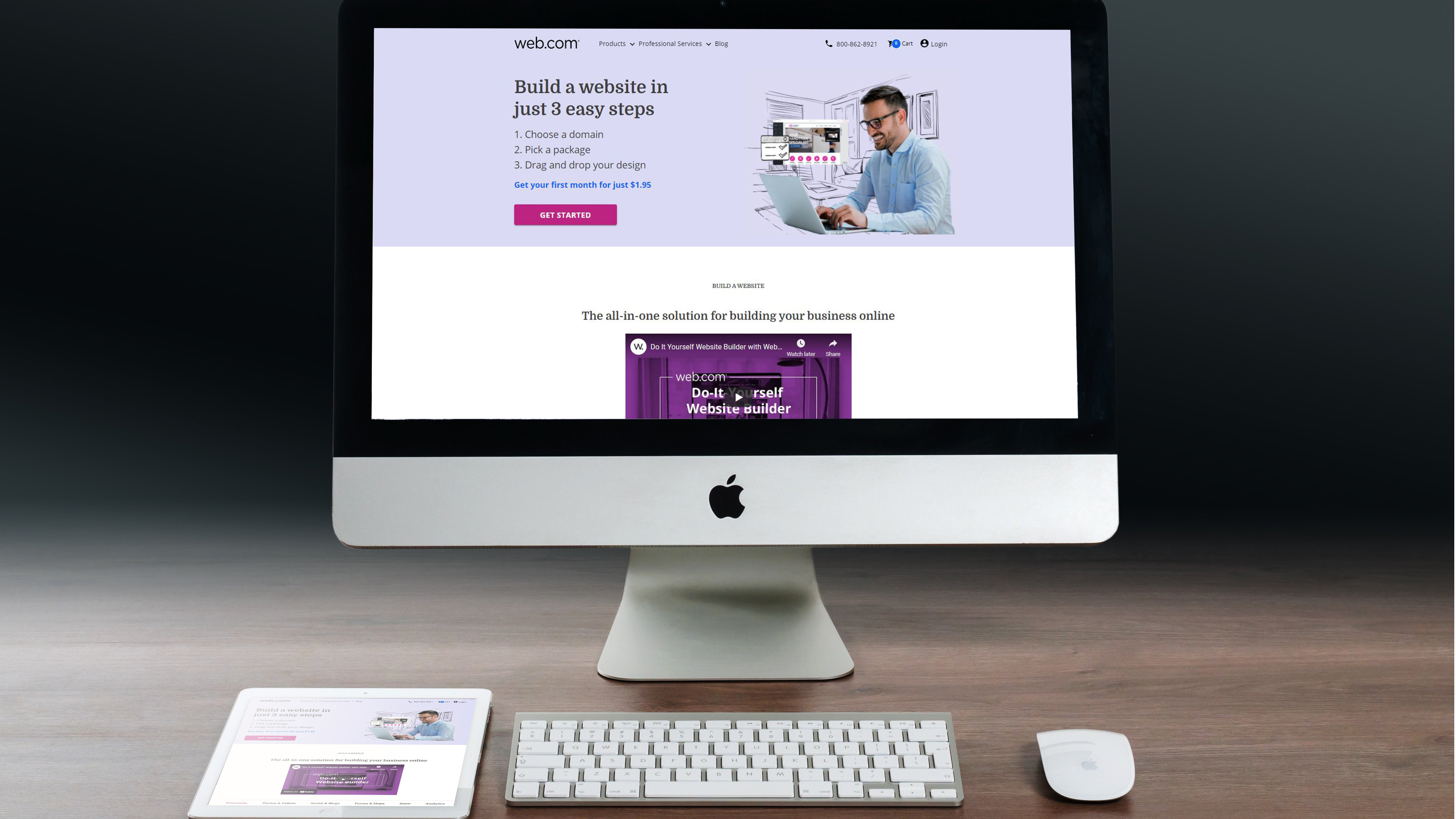
Web.com is a relatively new website builder in town, but this service has already made its mark, seriously impressing us by blending an elegant, easy-to-use interface with a good level of potential customization.
The central website building experience revolves around a system of modular elements you can simply drag-and-drop into place. Need a heading? A button? Icon? Text field? Just drop it in place. The interface also allows for blocks – pre-assembled elements such as an entire navigation bar which can just be inserted whenever needed. It’s a powerful and user-friendly interface, a potent combination.
Web.com also provides plenty of site templates to get started with, and makes it easy to switch views to see what your creation will look like on a PC monitor, or on a mobile device.
E-commerce functionality is available – albeit with a separate plan to the basic package – allowing you to set up an online store with all the functions you’d expect (although it’s not really suitable for bigger e-commerce ventures). And do note that Web.com’s blogging feature is still in beta, and currently is very basic – presumably it will be fleshed out down the line.
Pricing is very affordable with Web.com, and the customer support provided is of a high quality as well, so there’s a lot to like here. In short, you can put together a smart website with a minimum of fuss, while not paying anything like a fortune for the privilege.
There’s no option for a free trial here, mind, but that said, you only have to commit for a month when signing up (the initial fee is just $1.95 – complete with a free URL, with caveats), so that’s not a high price to pay to give the service a whirl.
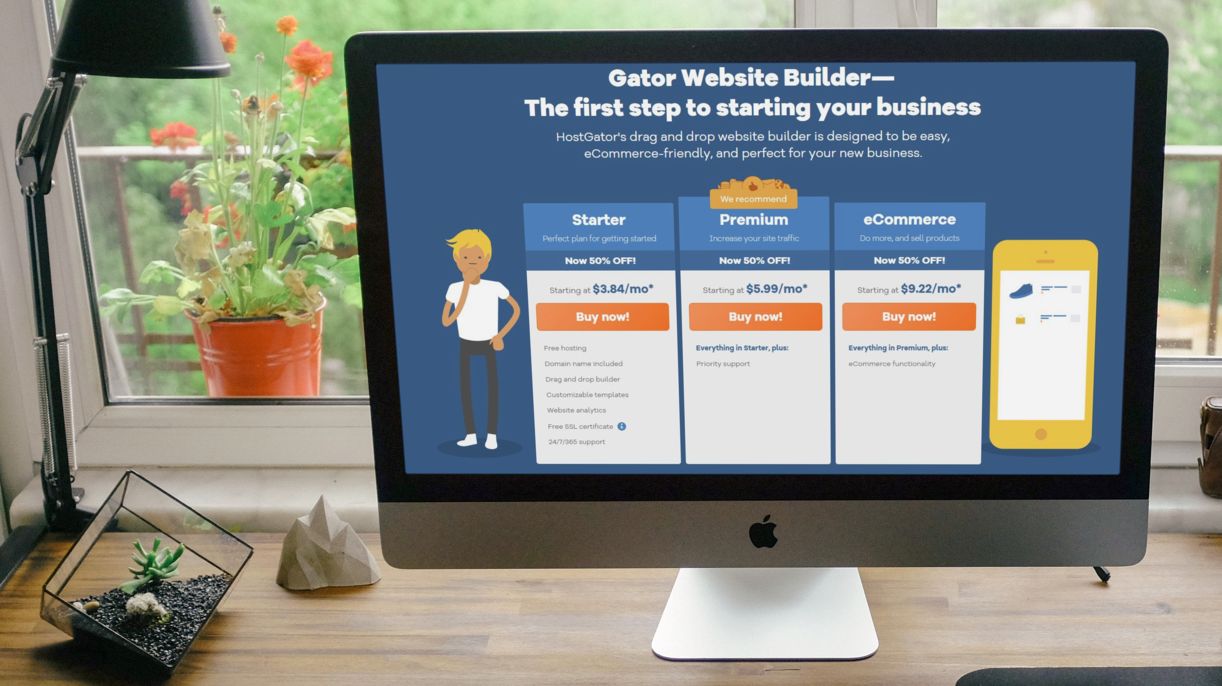
Another popular choice comes courtesy of HostGator, whose website builder solution, Gator Website Builder, has been commended for its simplicity and price, both of which should appeal to small businesses.
Gator is available in three versions. The Starter plan costs $3.84 ($3.46 with our special deal) a month and comes with free hosting, website analytics, free domain name registration for a year and unmetered storage. The Premium plan comes with all that plus priority support for $5.99 ($5.39 with our special deal) a month. The e-commerce plan, meanwhile, costs $9.22 ($8.30 with our special deal) a month and offers additional features like inventory management, a shipping and tax calculator, and the ability to create coupons.
Whatever plan you choose, you’ll gain access to an easy-to-use drag-and-drop interface that lets you employ commonly used design elements such as images, videos, text boxes, columns, maps and contact forms. Each of Gator’s 200+ web templates is fully customizable, so it’s easy to get your website looking just right. There are also a sizeable number of mobile-friendly themes available to ensure that your online portal looks good on all devices.
For small businesses that might not have access to top-quality photography equipment, Gator comes with its own built-in stock photo library and a number of video tutorials are on hand if you are in need of extra support with anything.
If there’s any real downside here, it would be the lack of functionality for larger, more complex websites. There are no built-in email marketing features, for example, and blog building options are relatively basic.
Still, for small businesses or anyone starting their first online project, Gator’s quick, professional and well-designed sites should work perfectly. And with 24-hour tech support on hand for all users, and free analytics solutions to let administrators know how their site is performing, there are plenty of reasons to choose Gator for website building.
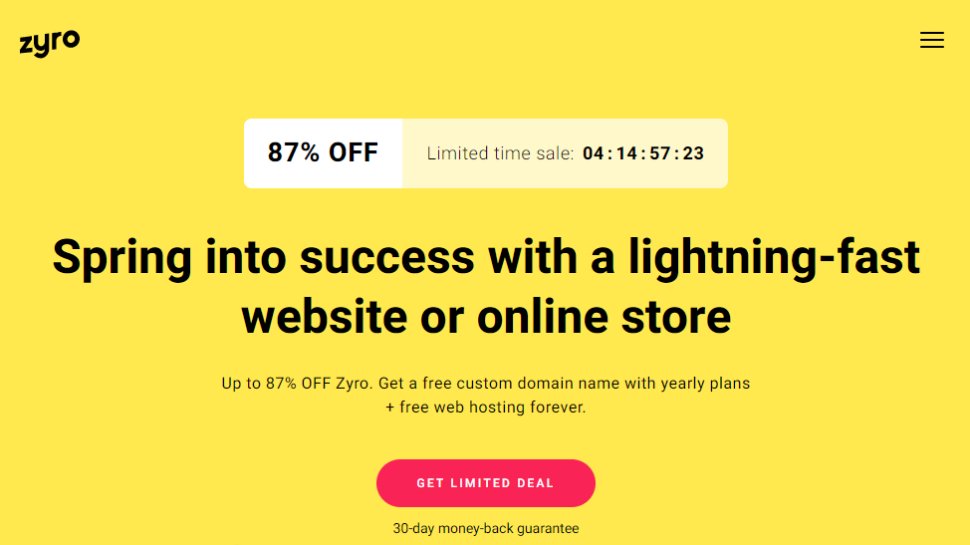
Hostinger's Zyro stands out for its simplicity – this really is the perfect site builder for businesses or individuals who may not have much experience creating their own website. A great drag-and-drop editor makes it easy to select design features, and the platform’s unique AI writer can even create some of the text content for you, potentially saving you hours of time. Once finished, Zyro websites load very fast indeed.
The web builder interface is also easy to use and setting up an account is straightforward. There are 150+ templates available, which isn't as many as some other providers, but that only plays to Zyro’s strengths in some respects. Rather than wading through countless designs, the smaller range of punchy options should help speed up the web building process for novices.
Zyro comes with a number of pricing options. The free plan comes with 500MB of storage and monthly data transfers, but users will have to put up with a few adverts. The paid tiers start with Basic which includes 3GB of bandwidth, 1GB of storage, AI business branding and SEO tools, for $2.90 a month.
The Unleashed plan, meanwhile, provides unlimited bandwidth and storage, as well as a free domain for a year, for $3.90 a month. Ecommerce plans that facilitate online payments, order tracking and tax management are also available.
Also note that you can get a further 10% off Zyro’s already impressive discounts by using the code TECHRADAR at checkout, so you can pay as little as $2.61 per month to build your site.
For small businesses Zyro website builder is an excellent choice - having the most required features from the customers Zyro is not overpowering their users with not needed features and functionalities allowing to get the easiest website building experience.
Given that Zyro is a relatively new player in the website building space, however, updates and improvements are coming all the time. For now, though, Zyro still makes a great option for anyone looking for a simple, intuitive website builder that delivers excellent uptime, 24/7 support, and doesn’t overwhelm with unnecessary extras.
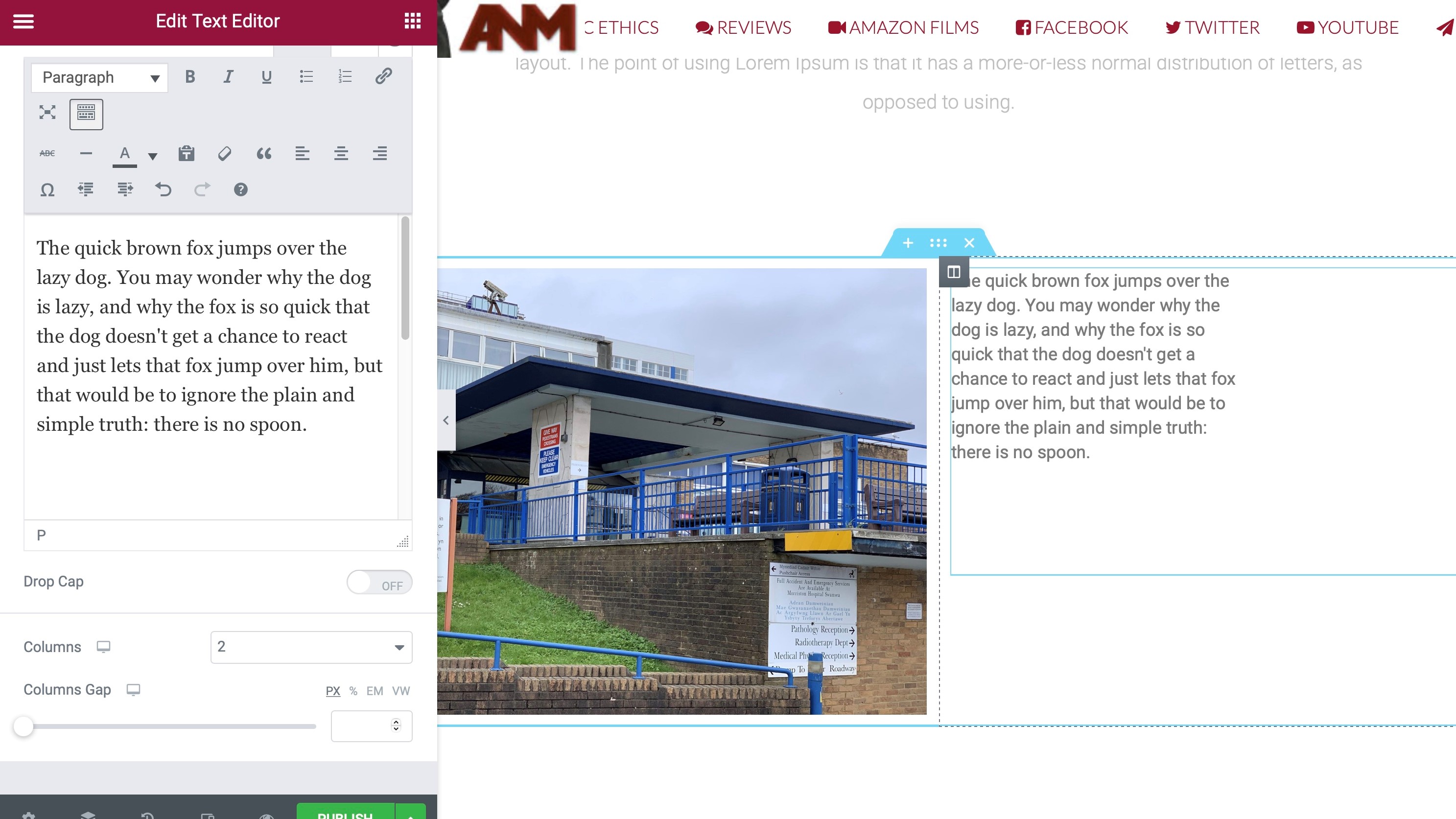
Elementor is rather different in that it’s actually a plugin for WordPress which functions as an easy-to-use website builder. There’s a free version which is impressively capable considering it costs nothing, as well as premium products.
The interface is a dead simple and streamlined affair allowing you to drag-and-drop whatever elements you want into place, while seeing what the results look like in real-time. There are a bunch of widgets and pre-designed templates on offer, and as you might expect, you get a lot more content with the paid-for plans (even the basic ‘Essential’ package has 300+ templates).
The Pro plans also boast more features, and they support running across multiple websites, as well as providing premium tech support (or live chat for the top-end subscriptions). You get a lot of editing tools here, and there’s a seriously impressive amount of customization to hand for your website creations.
Even the free option is pretty well fleshed out, as mentioned, and comes with 30+ templates (and 40+ widgets, though the full range is 90+). The freebie route may deliver enough functionality for some, and for those who’ll need more, it’s still a great way of checking out what you’re letting yourself in for before stumping up any cash (no credit card details are needed for signing up to the free plan, either).
The main downside with Elementor is that compared to some rivals, such as Divi Builder, the premium pricing isn’t so competitive if you’re running lots of websites – but the basic Elementor plans which support one or three sites are great value if that’s all you need.
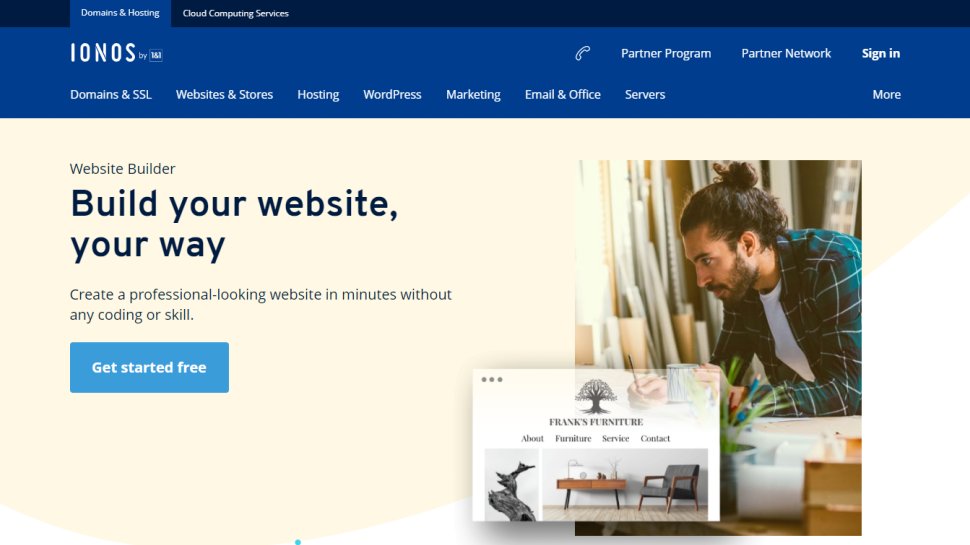
Europe’s largest web hosting provider, 1&1 IONOS, currently hosts more than 12 million domains and represents a great choice if you are looking to create a serious, professional website to promote your business.
While the lack of a free plan is disappointing (although you do receive the first month free), the paid options are reasonable enough, starting at $84 for the full year. For that price, customers can gain access to the MyWebsite Now or MyWebsite Creator packages. MyWebsite Now comes with a domain, email address and an expansive image library, but lacks some of the more advanced functionality that you get with the Creator plan.
Where IONOS really comes into its own, though, is with regard to its choice of themes. Inspirational templates are organized by industry and type, so it’s easy to find the right layout for your website, regardless of whether you are based in the retail, tourism or real-estate sectors. Some of the templates are more image-focused, while others cater to text-heavy sites. Regardless, they are all easy to implement; no coding knowledge is required whatsoever and templates can be adjusted easily using a drag-and-drop editor.
Small businesses are also likely to be enticed by IONOS’ multilingual translation, which can translate a site’s content into 62 different languages. It is even possible to have up to 25 different languages on a site at any given time. This makes IONOS a great choice in terms of its scalability: as a business grows, this website builder is more than equipped to facilitate international expansion.
Targeted content is also an option – so businesses can set up their website to present special offers to new visitors, for example. So if you’re looking for a scalable website builder with a great selection of themes, then IONOS is definitely worth considering.
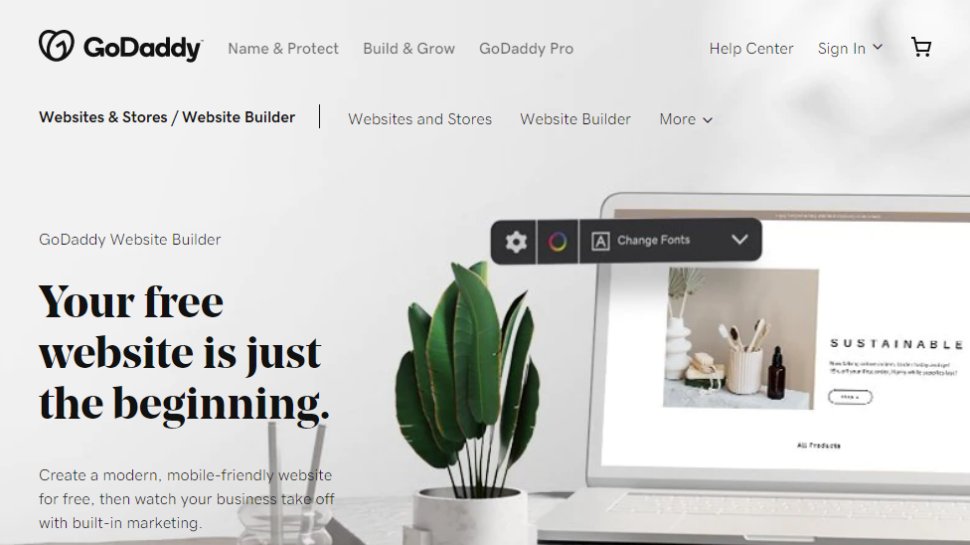
GoDaddy may be one of the most straightforward web builders around, boasting a hugely intuitive publication process and simple editing tools. This means that even if you’ve never built a website before, setting one up should only take a few minutes.
For individuals looking for a more in-depth experience, the GoDaddy Websites + Marketing solution provides a detailed analysis of how your site is performing. The analytics tool delivers a comprehensive set of metrics that compares how your online presence is performing against other websites in your field. So far, the tool has certainly proved successful, with customers experiencing an 18% increase in business revenue within 12 months of using it, GoDaddy claims.
Of course, challenges arise with even the most impressive online platforms and the GoDaddy Website Builder is no exception. Fortunately, GoDaddy’s support is among the best around. Extensive PDF guides cover a multitude of questions and troubleshooting topics, and 24/7 tech support is also available. Moreover, the community forums are a great resource and it’s likely that someone there will be able to respond to your query. A live chat feature is also available on weekdays.
In terms of pricing, GoDaddy is very competitive, offering four website builder pricing tiers. The prices range from $9.99 a month for the Basic plan, up to $24.99 a month for the Ecommerce tier. As you would expect, the Ecommerce plan comes with everything you need to start a full-featured online store, with the cheaper plans offering slightly reduced functionality as you work your way down.
Some people have complained about the lack of an app market, which can leave some of the site builder features lacking depth. It does mean, however, that all features are built in-house and so are fit for purpose. If you’re on the lookout for a website builder that is both affordable and boasts great support, then GoDaddy may be the right choice for you.
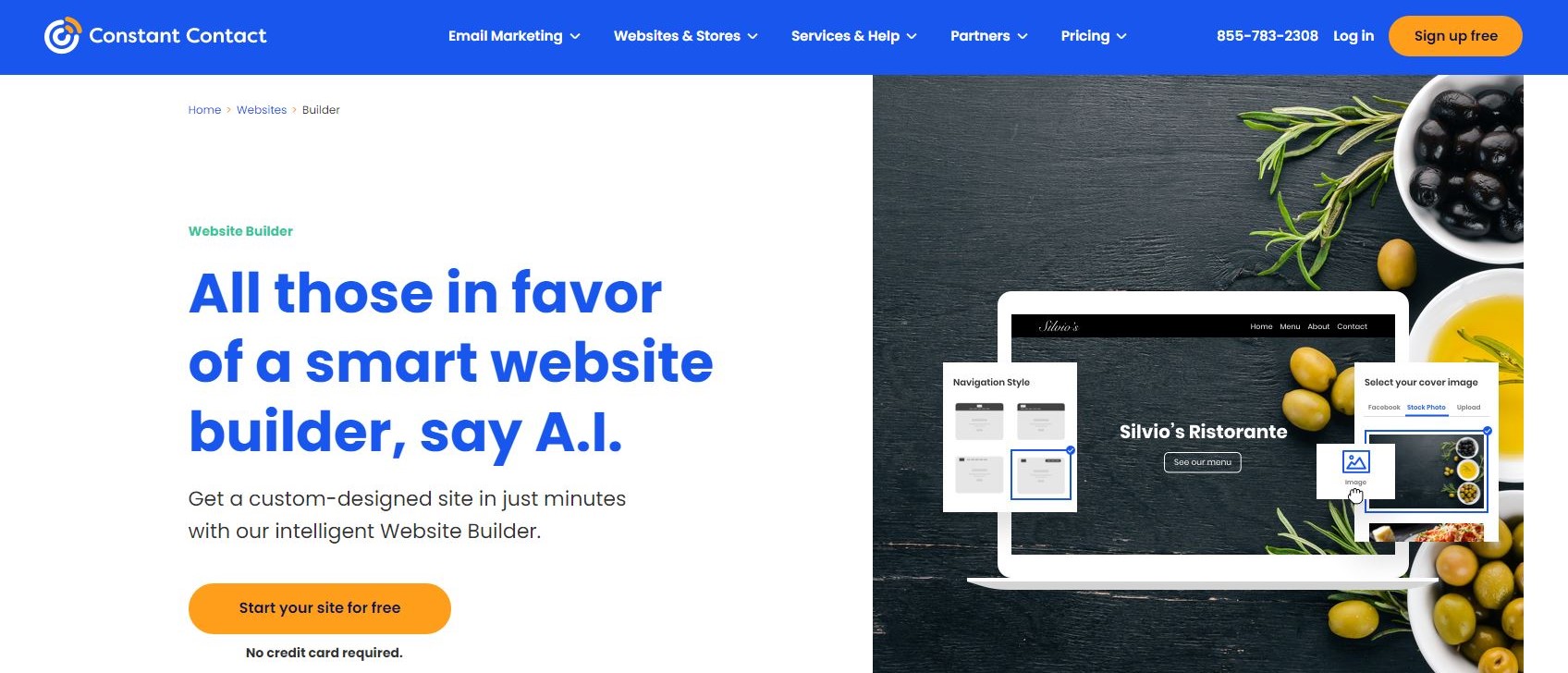
Although Constant Contact delivers an impressive website builder, it is best known for its email marketing solution. The site builder is a straightforward affair where users simply start by describing their business. In response, Constant Contact will automatically generate homepage previews to choose from, each of which come with high-quality royalty-free images to give your site a professional feel.
The website builder costs $10 a month and comes with ecommerce features, unlimited storage, an SSL certificate and SEO tools. Constant Contact’s website builder plan also provides analytics, app integration and the option of adding a blog to your site.
For businesses that want access to more email marketing features, however, Constant Contact’s standard website builder may not be what they are looking for. Instead, the Email plan provides all the features that modern companies need to build customer relationships and drive cutting-edge insights. Starting at $20 a month, it enables businesses to send an unlimited number of emails to up to 500 contacts.
It boasts customizable templates, automatic re-sends to contacts that did not open first time round and subject line A/B testing. The Email Plus plan, which starts at $45 a month for up to 500 contacts, includes advanced marketing features like polls, surveys and dynamic content, in addition to everything that comes with the basic Email plan.
Evidently, Constant Content has incorporated some of the helpful features that are now commonly included in traditional site builders into its email marketing platform. A drag-and-drop editor, for example, allows businesses to create slick campaigns, even if they don’t possess design or coding skills. The built-in campaign analytics also enables businesses to interpret which marketing campaigns are performing well, allowing marketing managers to keep return-on-investment in mind at all times.
All this, combined with robust security and several support channels, means we’d definitely recommend Constant Content as an email marketing solution.
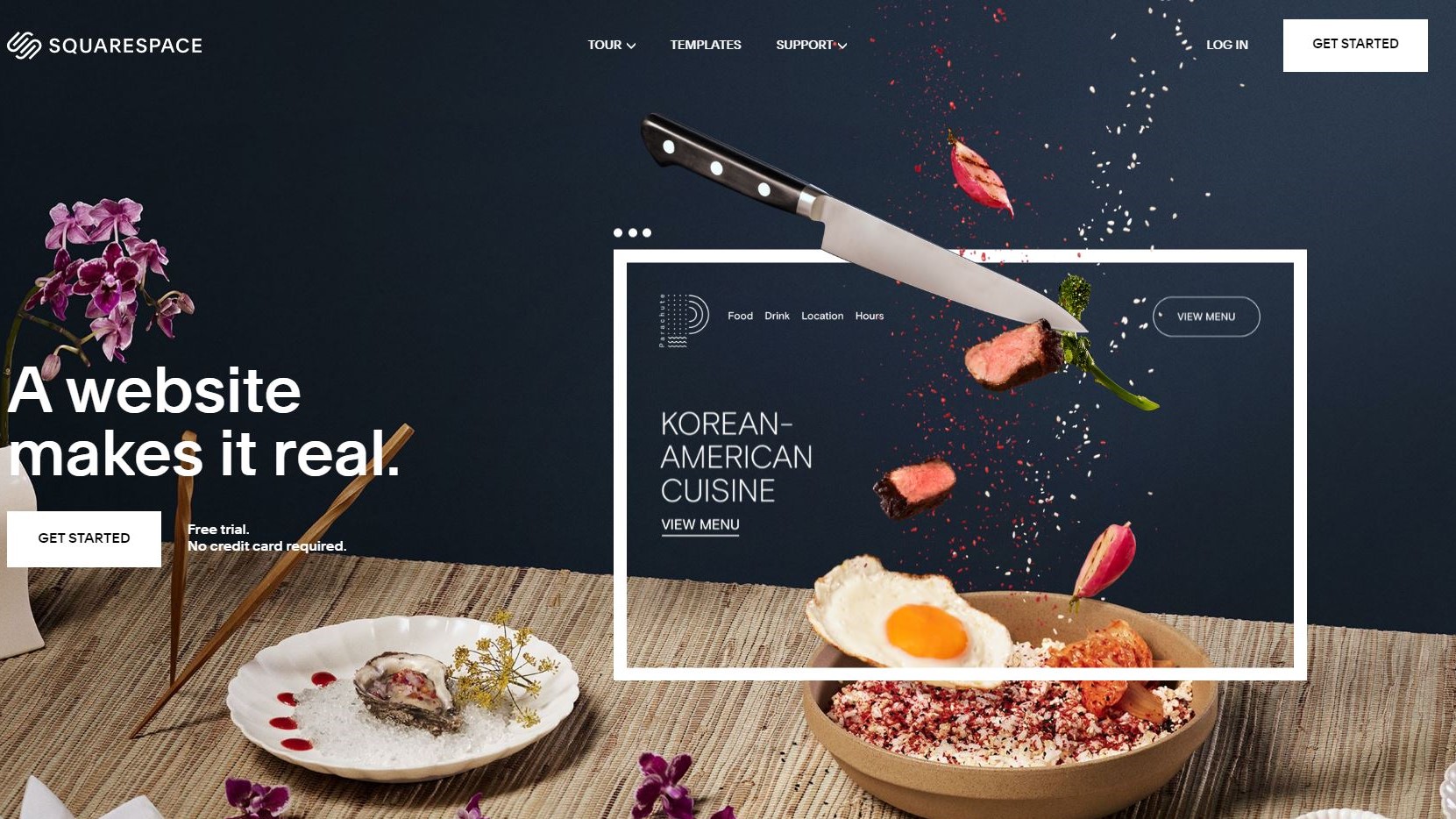
Squarespace is one of the slickest and best-known website builders around, and it has built this reputation, partly at least, on a fantastic range of features for bloggers. The platform comes with a host of built-in functions to support bloggers and writers, including multi-author functionality, AMP support and the ability to schedule posts.
Even better, Squarespace’s Blog App allows you to manage your blog from your smartphone, which is great for publishing and editing content on the go. Tools that publish to, sync with, and import from social media outlets, including Twitter, Instagram, Vimeo and others, also provide a great way of ensuring your posts receives the attention they deserve.
Squarespace’s drag-and-drop interface works a little differently to that used by some other website builders because it is section-based. This might take you a little bit more time to get used to, but doesn’t really provide a lesser experience.
Another benefit is the fact that deleted pages and posts can be restored up to 30 days after they’ve ended up in the trash. And if your online connection fails while you’re editing a post, it will still be there when the internet is back up and running (although it is worth noting that there is no autosave functionality).
In terms of drawbacks, it’s true that Squarespace may not be quite as easy to use as some of its competitors, and it can be difficult to find where certain features are located. It’s probably worthwhile reading a few of the support guides provided before jumping straight in. That said, setting up a new website remains relatively straightforward and there’s also an artificial intelligence-powered builder if you’d rather let Squarespace do most of the work.
The platform comes with four pricing plans, ranging from $12 to $40 a month, but whatever tier you choose, Squarespace is bound to deliver a great-looking website or blog.
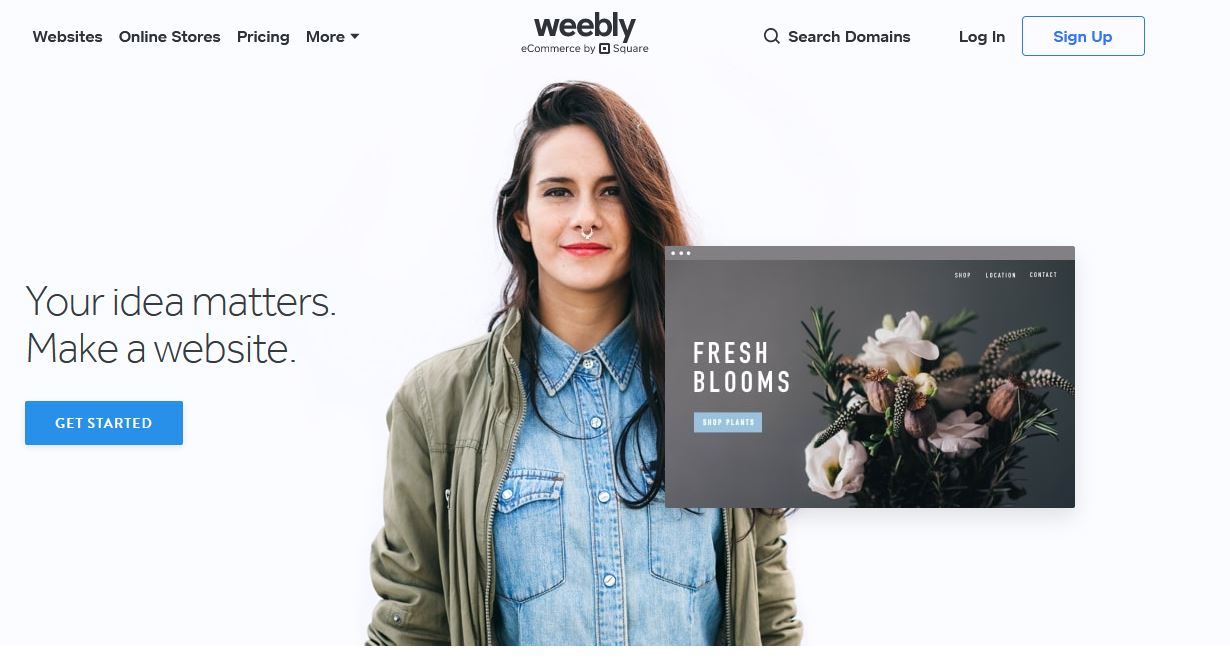
Weebly is a great choice for individuals looking to set up a website quickly as it launches you straight into the action. While some builders waste time with welcome emails and confirmation links, Weebly simply asks you to provide a name, email address and password, then away you go.
The service starts by asking you a few questions about your prospective website, such as what sort of theme you want, what your domain name is going to be and what sort of pricing plan you are interested in. Regarding the latter, there are three options (Personal, Professional and Performance) that each come with a range of features.
Where Weebly really stands out, however, is with regard to ecommerce. When starting out, users can select to build a “website with an online store” which will unlock a number of powerful features. Among them are a fully integrated shopping cart and secure checkout experience, an inventory tracker and a filtered product search tool.
The drag-and-drop interface that is a sought after feature with so many website builders also makes an appearance within Weebly’s ecommerce platform, allowing businesses to showcase their products with a range of display and merchandizing options. Social media integration is also included, allowing shoppers to share products via Facebook, Twitter and Pinterest.
Another major benefit of Weebly’s ecommerce platform is the support it offers users. Live chat, email support and a number of other resources, including several step-by-step guides, provide users with everything they need to get their store up and running.
The variety on offer here is also seriously impressive. Online store managers can sell physical goods, digital products or services, and retailers are able to set their own price and define their own configurable product options.
It’s true that the lack of an Artificial Design Intelligence option may mean that setting up an online store takes a little longer than you want, but once you’re up and running, there’s no shortage of great features available for you and your customers to enjoy.
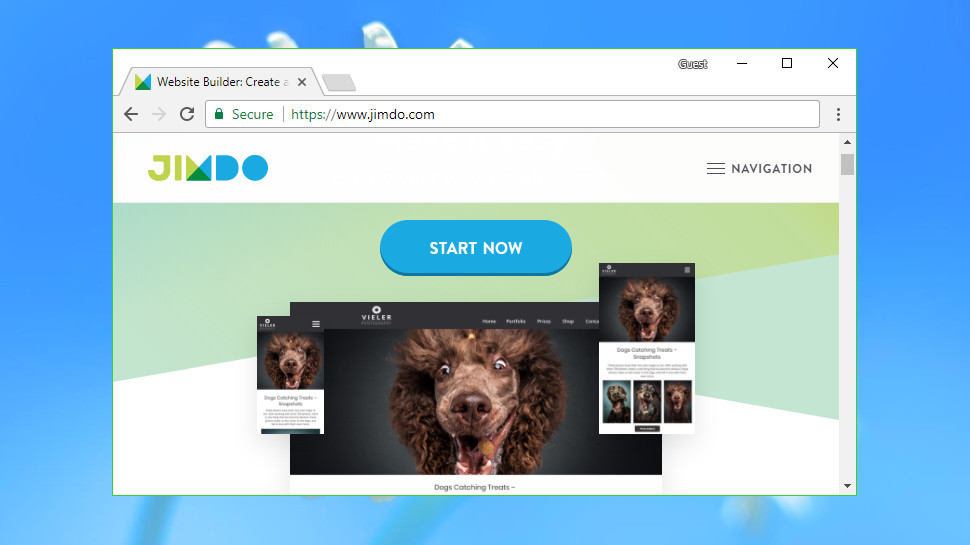
Since 2007, more than 25 million websites have been created using Jimdo, with its simplicity receiving plenty of praise. Another area of strength is the way that it looks, with a range of clean, flexible templates on offer. The professional and modern styles available make Jimdo a great website builder for designers, photographers or anyone else who wants to display their portfolio online.
The platform even comes with its own Logo Designer to help make your brand recognizable. All you need to do is enter your business and select a starting point for your logo design. Then, you customize your icon and layout, choose a color and font, and that’s it! Your logo is ready to adorn your business cards, social media pages and your website.
Another useful design feature that Jimdo users will appreciate is the way that website colors automatically harmonize with an uploaded logo or image. This means that garish color clashes become a thing of the past – that's great for businesses where looking good is part of the brand.
Furthermore, Jimdo comes with a host of tips and support documents to help you create the right website for you. This includes a number of examples of existing photography websites created using the platform, along with tips to build a successful site.
Other pros of using Jimdo include its speed as well as simplicity. First off, users have a choice between going with Jimdo Creator or Jimdo Dolphin. Creator has more than 100 templates broken down into four categories (Business, Store, Portfolio, and Personal) and there are plenty of customization options. Dolphin, on the other hand, gives you an AI-created website. There is also a collaboration with Facebook, which allows you to sell your products directly on Facebook and Instagram.
In terms of price, there is a free plan that comes with no time limit but will force you to have a Jimdo sub-domain and advertising. Some Jimdo users have complained about a lack of fancy features, but if you want a quick, straightforward way of launching a great-looking site, you’ll struggle to find a better website builder than this.
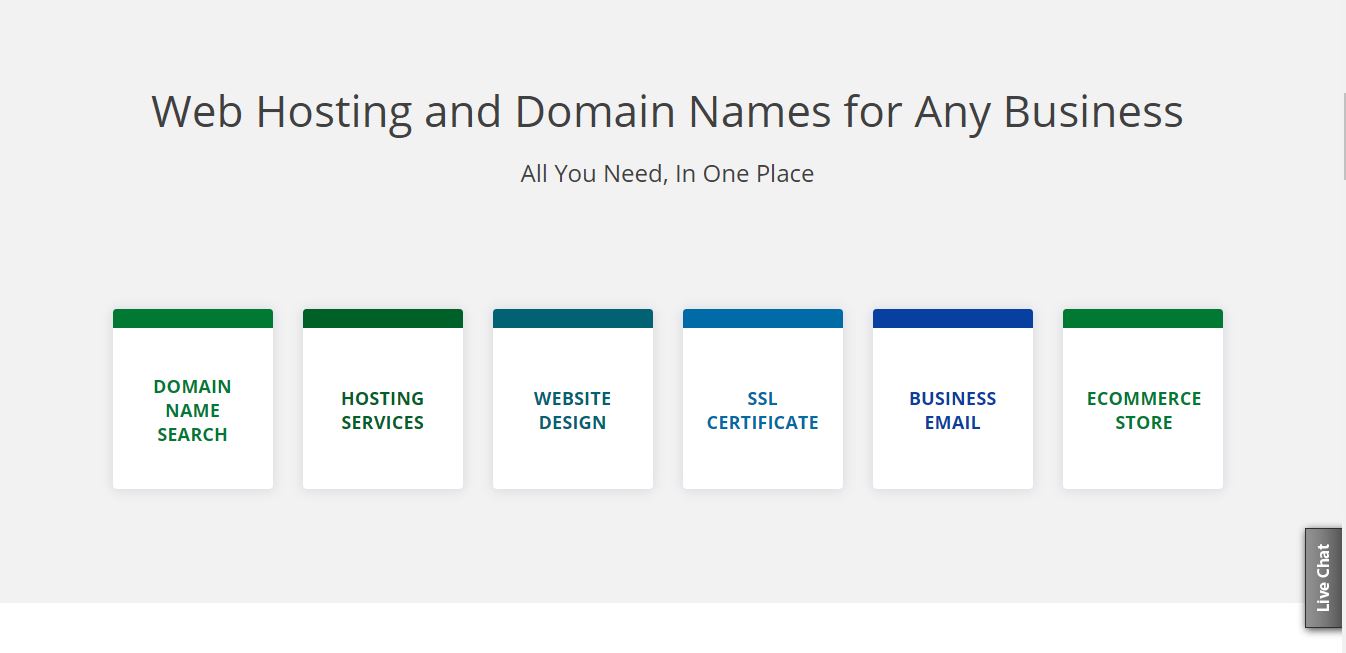
Network Solutions is a great website builder for any businesses that remain unsure of what direction they want to take their website in. There are a huge number of options on offer here, so there’s bound to be one that’s right for you.
With Network Solutions, you can choose to build a website yourself or instead opt for professional website design services. The DIY plan comes with a personalized domain name and matching email address, point and click editing, as well as a well-stocked image library. The professionally designed option is more extensive, however, and comes with SEO tools, web analytics, and unlimited changes in the first 30 days.
Network Solutions has more experience than most when it comes to providing online services, first getting involved with DNS registration back in 1991, but that doesn’t mean it isn’t able to deliver more modern touches.
One of the best aspects of the Network Solutions website builder is its mobile-friendly approach. The builder comes with thousands of design options to choose from, and with the professionally designed plan, you will receive guidance to ensure that your website loads as fast as possible. Given that 53% of mobile users abandon sites that take more than three seconds to load, speed is an absolutely vital consideration for a successful mobile site.
Although the website designer interface can seem a bit dated in places, and some users have complained about persistent upselling, there’s a lot to admire about Network Solutions website builder. The prices are competitive and there’s just enough customization to provide a good amount of flexibility without things becoming overwhelming. Furthermore, all ecommerce plans come with a fully customizable storefront along with a mobile version.
It can be a bit no-frills at times, but for any business looking to craft a simple, professional-looking mobile site, Network Solutions is well worth a look.
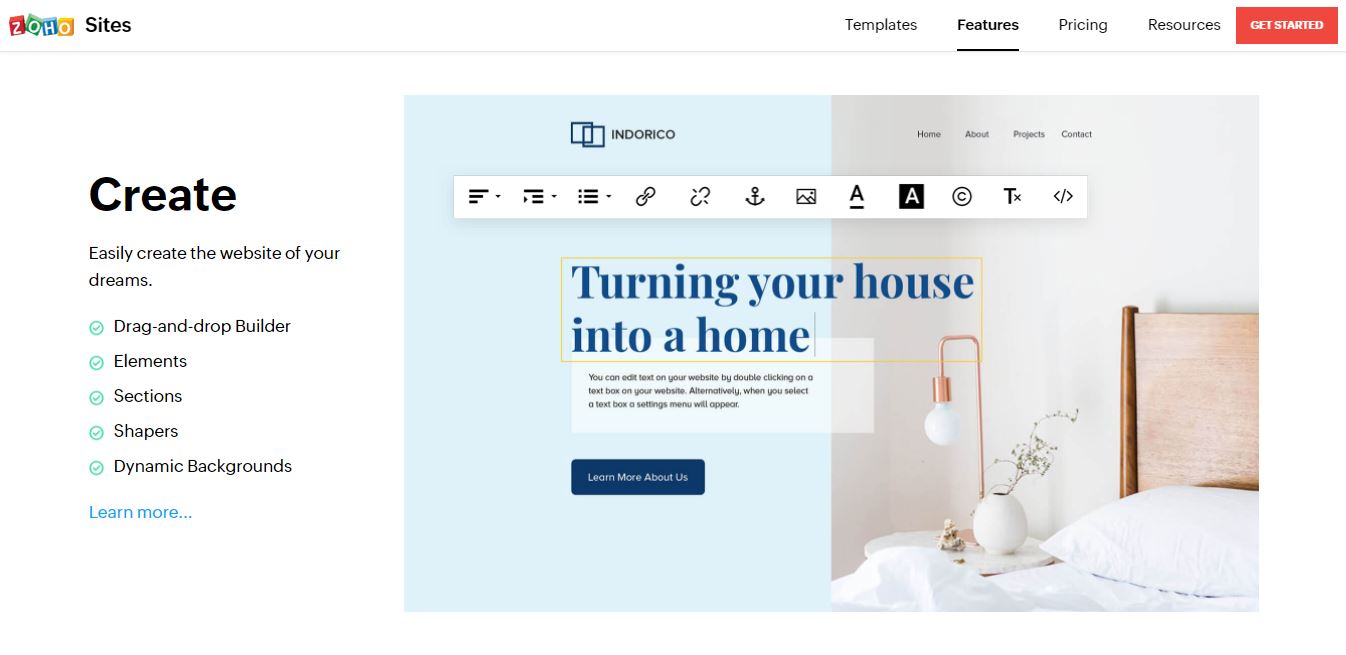
As with most website builders on offer these days, you do not require any technical knowledge to get the most from your Zoho Sites experience. The platform offers an impressive range of features, including more than 190 template options, an extremely well-organized interface, and a user-friendly code editor.
In terms of price, it’s worth noting that Zoho does not offer an unlimited free option, but you will be able to trial the platform for 15 days before committing. After that, there are two different plan options, Starter or Pro, both of which come with custom domain hosting, mobile optimization, and SSL certification.
One of the major advantages of using Zoho Sites is its flexibility, which means that it is perfect for businesses experiencing rapid growth. With the Pro plan, there are three separate add-ons you can purchase as your company expands. If you need capacity for more members, more web pages, or more contributors, there are appropriately priced add-ons for each.
What’s more, many of the other products within the Zoho family are well suited to larger organizations. For example, Zoho Projects, a project management suite, is perfectly suited to workplace collaboration, regardless of how large and spread out your organization is. Other tools like Zoho Books, Zoho Reports, and Zoho Creator are likely to prove equally useful.
In terms of downsides, Zoho Sites offers fairly limited integration with third-party features, including some of the main social networks. While it does offer a pretty extensive list of in-house applications that you can integrate with, including a CRM and marketing hub, the inability to simply plug-in external apps may be an issue for some.
Still, with a huge range of design options, newsletter support, e-commerce features, and analytics tools, Zoho is a great option for any fast-growing business or, indeed, any company that has already acquired a large customer base.
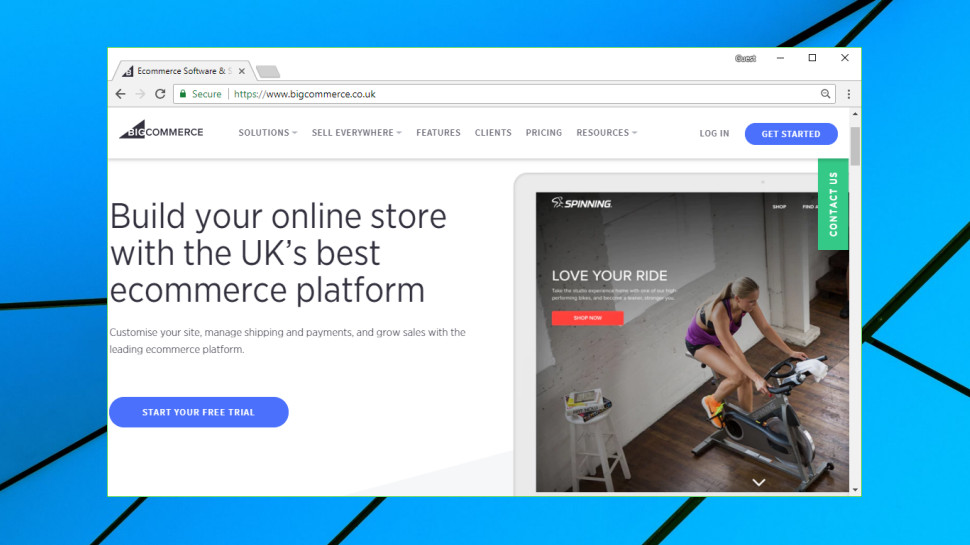
No business can afford to be without a website these days and that remains particularly true for retailers. The ecommerce share of total global retail sales has continued to increase steadily in recent years and is only likely to continue growing. When looking to build a new website, therefore, finding a web builder with the right ecommerce features can prove critical to business success. While many website builders offer some form of ecommerce functionality, some are certainly better than others – and BigCommerce may just be the best around.
Offering great scalability, a host of built-in features, fantastic SEO tools, and the ability to sell across multiple channels, BigCommerce is geared towards big brands that have plenty of customers to satisfy.
First of all, the platform makes it easy to build a store that looks good, with a drag-and-drop visual editor, fully-customizable themes, mobile optimization, and checkout customization. There’s also plenty of support once you are ready to start selling. BigCommerce lets users sell physical, digital, and service-based products without needing to use an app and doesn’t lock sellers into a single payment plan, giving them more than 65 different payment gateways to choose from.
In terms of drawbacks, BigCommerce can use complex terminology at times that might make it a little confusing for inexperienced website builders and its design interface can take some getting used to. Having said that, it’s still not a bad choice for smaller retailers, as it has a staggered pricing plan dependent on how many sales your site generates. There’s also a free15-day trial available, with no credit card details required.
Overall, with more built-in sales tools and more scalability than its competitors, BigCommerce is a great choice for online retailers that have significant sales figures or smaller brands that are planning for major expansion.
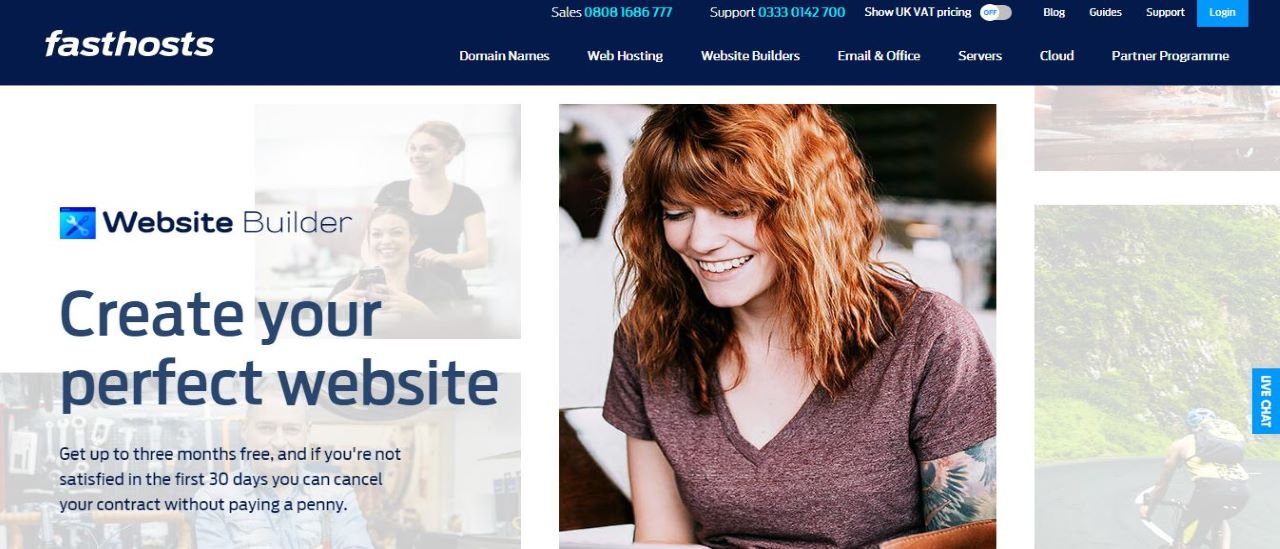
As its name suggests, one of the standout aspects of Fasthosts is how quickly it allows you to get your website up and running. Even the most inexperienced online user should be able to create a beautiful site in minutes by using the platform’s wide range of adaptable themes and its intuitive drag-and-drop interface.
Users will have the choice of two plans, the Essential or Complete Website Builder package. The Essential plan costs $8.5 a month and comes with all the essential features, including a domain name, a personalized email address and up to 10 pages. The Complete plan, meanwhile, comes in at $11.85 a month and boasts an unlimited number of pages, SEO tools, and additional email tools.
In addition, one of the aspects of Fasthosts that frequently receives praise is the amount of customization it offers. When adding content to your site, you will receive a number of customization options depending on the type of material you have uploaded. Furthermore, Fasthosts comes with an established support website that contains a number of how-to guides that provide additional help for individuals that want complete control to tweak every aspect of their site. The platform is also mobile optimized, so users can make quick edits easily from their tablet or smartphone.
In terms of complaints, some users have criticized Fasthosts for having a poor average uptime record, which is something that individuals who are thinking of using Fasthosts for web hosting should consider. Others have argued that its interface can look a bit sparse, and would perhaps benefit from the addition of a few extra features.
However, there’s still plenty to admire about Fasthosts’ website builder, particularly its 30-day money back guarantee and the fact that users of the Complete plan receive their first three months free-of-charge. That means that new users get plenty of time to tinker with their site before deciding if this is the right builder for them.
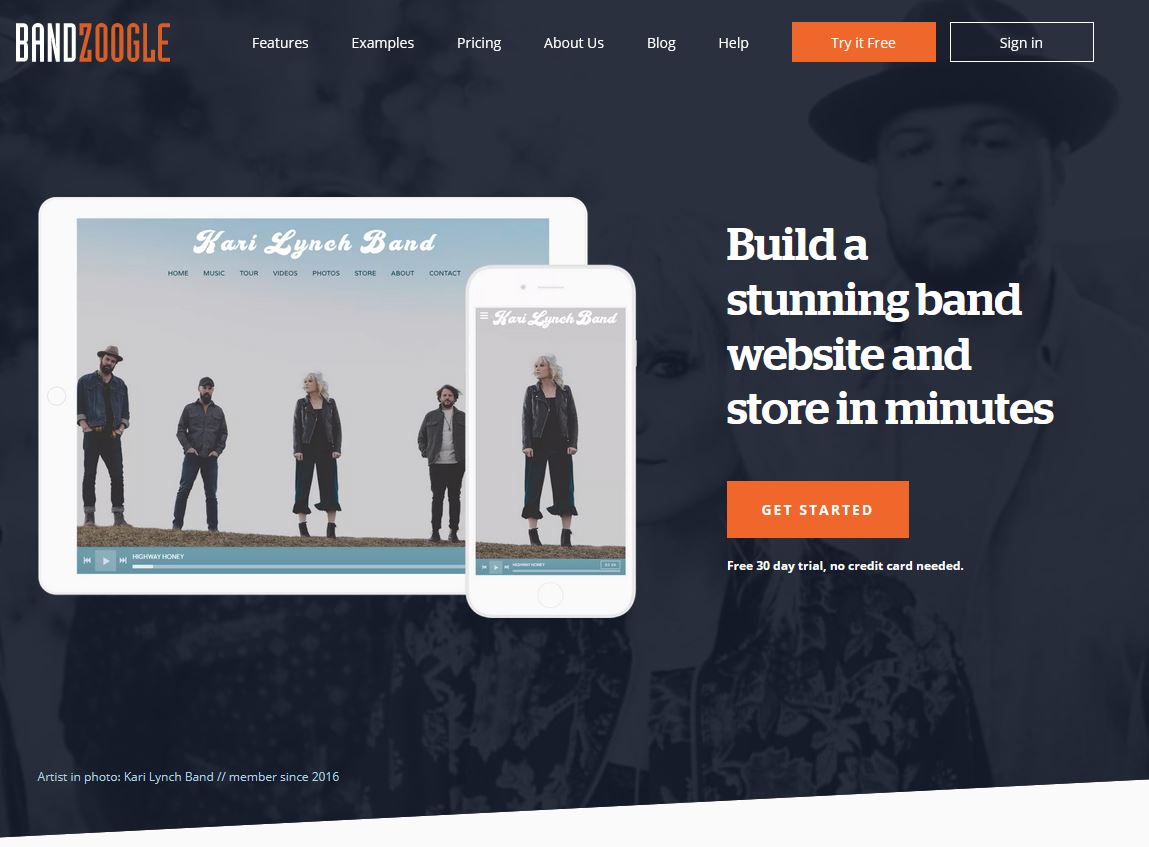
As with most industries, the internet has revolutionized the music world. The likes of YouTube and Spotify have meant that musicians around the world mostly connect with their fans online, sharing new music and advertising gigs. But this also means that most musicians depend on having an effective website in order to be successful.
For well-known acts with major record labels backing them, it is unlikely that they’ll have to manage their own online presence, but smaller acts will have to be more hands-on. Fortunately, there are website builders that cater specifically for musicians and Bandzoogle is one of the best.
As with most modern website builders, Bandzoogle is easy to use and offers a range of mobile-responsive templates that are straightforward to implement and easy to customize. Custom domain names are also provided and users have reported good levels of site uptime.
Looking at features that specifically target musicians, Bandzoogle allows website administrators to upload tracks that fans can stream directly from the website. It is also straightforward to add gig data and blog posts to the site, and connecting to music-specific platforms like SoundCloud and Bandcamp is supported.
Of course, engaging with fans is one of the most important reasons why many musicians create a website and Bandzoogle really excels here. Musicians can use the platform to create mailing lists, connect with their social media profiles, and receive visitor analytics to gain insights into how fans are interacting with the site.
Crucially, Bandzoogle comes with excellent support offerings, whether your queries are about websites generally, or building an online presence as a musician. Bandzoogle’s web team is made up of musicians, so the advice they offer is always relevant to the industry. Although Bandzoogle can be used to create a website that is not music-related, the platform has all the features needed to keep budding musicians and their fans happy.
- We've also featured the best small business website builder
What is a website builder?
Contrary to what you may think, website builders have been around for a long time. Ever heard of Geocities or Angelfire? They were the precursors of today's giants like Wix or Weebly.
At its simplest, you can think of it as a set of templates like you would get in Microsoft Word. A website builder removes the need for you to know any coding language like HTML or Javascript and relies on something called WYSIWIG to get you online.
WYSIWIG stands for "What you see is what you get" and is essentially a graphical user interface that allows even novices to move around pictures and type in blocks of text as they'd do in a scrap book in the physical world.
Metaphorically, the concept is as close as you'd get to having a virtual shop (or house or property) online and website builders have been very smart in keeping things as simple as possible.
How to choose the best website builder?
There is great variety in terms of both the number and type of website builder available today. Some specialize in email marketing and others offer a first-rate ecommerce solution; some value simplicity, while others deliver so many customizable features that it could overwhelm a novice website creator.
When deciding on a website builder, therefore, it’s important that you have a clear plan in your own mind first. Think carefully about what sort of website you are looking to create – whether text or images will be the main focus, what sort of design you have in mind and, crucially, how much you want to pay.
Once you’ve come up with a mental framework for your prospective site and have a rough idea of your budget, you can start to look at your options. Whether you’ve used a website builder before will also be important to determine how comfortable you will be using some of the more complex platforms on offer.
You should also consider whether you’re likely to do most of your website editing from a mobile or desktop device. Most web builders offer mobile-responsive templates, but not all allow you to edit the mobile version without changing the desktop site too.
Choosing a website builder can seem complicated, but fortunately most come with free trials so you always have the option of changing your mind.
Website builder vs web design software ?
Website builders and web design software certainly have plenty of overlap. Both can be used to create beautiful, professional looking websites that have all the features that your business needs. The key difference lies in how they are delivered and how much prior knowledge is required to use them. In general, website builders are online platforms, often available in free versions, and which place a great deal of emphasis on simplicity, usually offering drag-and-drop editors. Web design software, on the other hand, is usually a bit more complex, with some geared towards experienced programmers and offering the option of coding a site line-by-line.
Another key difference between web design tools, such as Adobe Dreamweaver, and website builders, like Squarespace, is the price. Web design tools are often more expensive and there may not be a free option like there is with most website builders. Although web design tools will try to offer an intuitive experience, it’s probably a good idea to have some coding knowledge before giving them a try. Ultimately, whether a website builder or web design software is right for you will largely depend on your level of experience and also what sort of site you need. In most cases, a simple website builder will be sufficient, but if you want to tinker a little more, there’s no harm in trying a web design solution.
Free website builders vs paid website builders
Why pay for a website builder when you can get one for free? Well, as is often the case, you usually get what you pay for. That isn’t to say, however, that there aren’t some great free website builders out there. Many free builders still come with all the features that you need to create fantastic online portals – customizable templates, intuitive drag-and-drop editors, marketing tools, and mobile optimization. Having a clear idea of how you want your website to look and conducting thorough research is key to avoiding paying more for a website builder than you need to.
It is true, however, that some features are less commonly included in free website builders. E-commerce tools, for example, often have to be paid for and there are a number of other features that are usually excluded from free plans. Free website builders are often accompanied by advertisements that you will have no control over – you might not mind this but they can sometimes be intrusive. What’s more, they can make your site look unprofessional. Similarly, free website builders won’t give you a dedicated web address, which can also affect your credibility. Fortunately, many paid website builders have free trials that let you try before you buy.
How much does a website builder cost?
There is no straightforward answer to the question: “How much does a website builder cost?” For businesses that are satisfied with simple templates and are happy to put up with ads and a generic URL, website builders can be found that don’t cost anything at all. Of course, most brands would not be content with a free solution, which can deliver sites that look unprofessional. The good news is that there are some very effective website builders out there that are reasonably priced. Most work through a monthly billing system, with costs for entry-level plans sometimes as little as $6 a month.
One thing that all website administrators should be aware of, however, is how much website builders charge for additional features. Even if your basic web builder package is cheap, costs can quickly escalate if you have to buy add-ons for security, e-commerce functionality, and marketing tools. It is important that businesses have transparency when it comes to the expenses related to their website, so it’s probably a good idea to research prospective platforms thoroughly before making your choice. It’s also important to factor in whether your website builder is scalable: will it remain suitable as your business expands and how will costs increase?
How hard is it to build a website?
It may sound like a daunting prospect, but building a website is not necessarily difficult – although of course that all depends on how hands-on you want to be, the type of website you want, and your level of experience. Fortunately, many website builders are designed to appeal to the absolute beginner, coming with drag-and-drop editors that mean no coding experience is required at all. In fact, most web builders will have you up and running with a fully functioning site in under an hour. Alternatively, individuals with greater financial resources could hire a professional web designer to build their website for them.
For those that are willing to take on the website building process themselves, the level of difficulty involved will depend on what website builder they choose. Although all of them are relatively intuitive, some come with extra features that may require some knowledge of the website-building process to implement. Fortunately, most platforms come with decent levels of support, including how-to guides and video tutorials. It is worth mentioning, however, that many of the simplest website builders come with limited customization. For anyone that truly wants complete control over their site, some coding experience, as well as prior knowledge of HTML, will come in helpful.
What are the most popular website builders?
There are an overwhelming number of website builders available today – ones that are free, ones that cater for specific careers, ones that target small businesses, and many more besides. While each individual website builder will have its own unique pros and cons that users will need to assess themselves, taking a look at some of the most popular platforms is a good place to start. Taking top spot is Wix, which boasts over 180 million users in 190 countries. The platform has managed to build up such a large following by combining a huge range of powerful features with a user-friendly interface.
However, while Wix may be the most popular website builder in the world, it still has its fair share of competitors to deal with. Other popular website builders include Squarespace, GoDaddy, and Weebly. Looking at more bespoke builders, Shopify has become extremely popular by offering a broad spectrum of ecommerce tools for online retailers. It’s important to note, however, that the most popular website builder may not be the best one for your needs. You are unlikely to go too far wrong with the big players, but smaller, more niche web builders may offer better payment plans or more relevant features for your site, so it’s important to research thoroughly before plumping for any particular website builder.
Who uses a website builder?
Determining whether a website builder is right for you is a question that can only be answered fully once you’ve assessed your own personal online experience, what you want from a website, and your financial resources. Even so, the type of person that would benefit from using a website builder is pretty broad. On an individual level, there are web builders that specifically cater to musicians, photographers, and many other solo endeavors. More generally, a website builder is a great platform for any person that simply wants an online presence. If they have a hobby that they want to share with the world, a web builder provides the tools to achieve this.
Website builders are also readily employed by small business owners. Many web builders come with ecommerce features that allow businesses to sell their products and services online, as well as marketing tools to increase their customer base. Large corporates might decide to employ a professional web designer instead, but smaller firms will probably prefer the ease-of-use (and price) of a web builder. Put simply, a website builder is a great starting point for anyone that wants a website of their own but doesn’t know where to start.
WordPress vs a website builder: Which one is better for building a website
Using WordPress or a website builder are both great options for anyone looking to build a website but each comes with its own advantages and drawbacks. Different from a website builder, WordPress is actually a content management system, or CMS, and is used to power 39% of the web. Since it was first launched, WordPress has added a number of features beyond its basic CMS offering, providing themes, add-ons, and ecommerce functionality. Novice website builders, however, may find that WordPress has something of a steep learning curve. The language can be quite technical and users may even need to adjust the odd piece of code in order to get a plugin to work.
While WordPress does offer both live chat and email support, less experienced users may find that a website builder is more welcoming. Most website builders pride themselves on their ease-of-use, with many using drag-and-drop editors that allow individuals to have their webpage up and running in a matter of minutes, even if they have no web building experience. Both WordPress and website builders come with several different payment plans to choose from and both are capable of producing fantastic looking sites. Neither approach could be said to better than the other, but website builders are certainly simpler to use in most cases.
Website builder vs web hosting: What’s the difference?
Most online users probably think of websites residing at their respective web address. In reality, websites need to be stored in a physical location as well, on servers somewhere. Web hosting refers to the provision and maintenance of these physical servers. Every website needs a web hosting provider in order to run the physical infrastructure that they depend upon to remain online. Complicating things somewhat is the fact that there are different types of web hosting available. Shared hosting is perfect for smaller sites as they share resources with other webpages in exchange for reduced fees. Dedicated hosting is more expensive but comes with more customization options, higher bandwidth, and better security.
In its simplest form, a website builder only provides the tools to design a web page and is not involved with the physical web hosting at all. However, many website builders also offer web hosting - although an additional cost may be applied. Of course, for anyone that does not use a website builder to create their online portal, they’ll need to source their own web hosting provider separately. Put in the most straightforward terms, a website builder affects how a website looks, while web hosting tells you where a website is physically stored.
What are the largest website builders?
As of March 2021, the biggest website builder in the market is Wix with a market capitalization of nearly $17 billion and an estimated 200 million users. The Israel-based company competes with Weebly, which is a subsidiary of financial powerhouse Square Inc, which itself is valued at almost $100 billion. Other companies that have significant market capitalization include United Internet (Ionos) and Godaddy.
How many website builders are there?
We have more than 100 in our database but there are probably hundreds of website builders out there if we use the loose definition of that being a service or product to, well build a website. Semantics aside, a website can be a single web page and can be a piece of software as well (like Dreamweaver). So, a landing page builder, a funnel builder, a web design software, a service - like Mailchimp - that offers website building as a feature, an ecommerce platform (like Shopify) are all technically website builders.
The Domain Report
Your website building journey starts with buying a domain name
Your domain name is the calling card for your website. A strong name means a strong brand, so your digital presence begins with a good start.
That’s why we took a deep dive into all aspects of web domains - including which countries have the most registered domains, the biggest domain registrars, the most expensive domains, and features of website builders to take your domain to the next step.
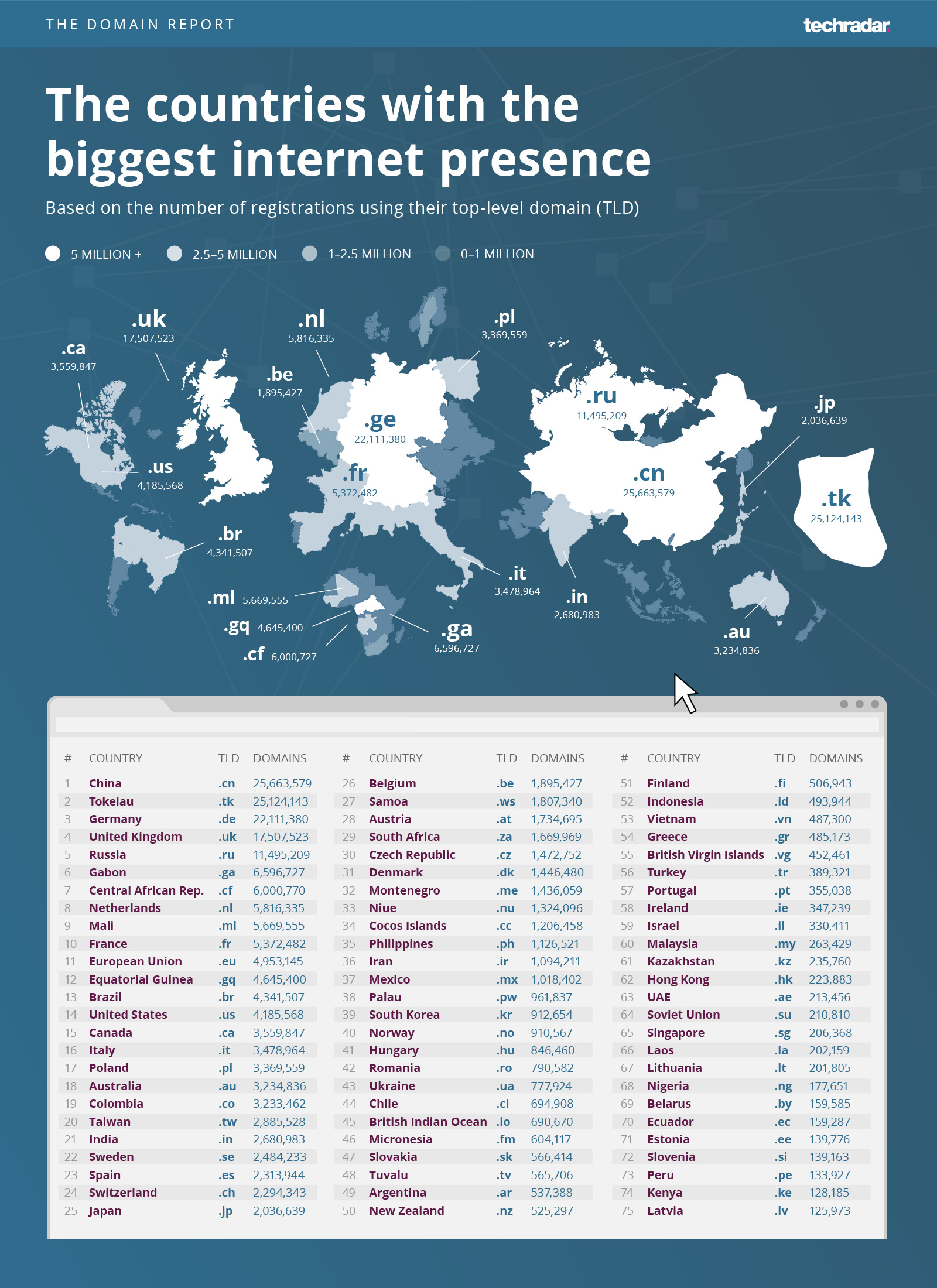
1. Which country has the largest digital presence on the internet?
The country code for Chinese domains accounts for one of every nine domains on the internet, the largest of all.
Aside from China’s digital domination, these are the countries with the largest internet presence (based on country code top-level domains):
- China
- Tokelau
- Germany
- United Kingdom
- Russia
- Gabon
- Central African Republic
- Netherlands
- Mali
- France
2. The largest top level domain on the internet is .com
The .com TLD accounts for nearly 35% of the internet, with over 176 million domains using it. However, .com isn’t the official TLD of the USA like you might think. That honor goes to the TLD .us.
3. The most expensive domains ever bought (and sold)
Some domains are worth more than others due to their notoriety or what the domain name can stand for, such as household names like Hotels.com. That domain could be worth up to 47.89% more in 2021 than when it was originally sold in 2000 for $11,000,000.
Find out more in our full report
You might also want to check out our other website hosting buying guides:
WordPress hosting is hosting that has been built to run WordPress and meet its performance and security needs.
Cloud hosting makes applications and websites accessible using cloud resources.
E-commerce e-commerce has become a massively lucrative channel for retailers.
Opting for a dedicated server means that you get an entire server to yourself.
Opting for a Windows hosting doesn't restrict you to Microsoft products.
Managed web hosting is when a hosting service provider leases you a dedicated server but manages the server themselves.
If you’re sold on the idea of going green when it comes to your web hosting, check out our pick of the green hosting crop.
Email hosting plans are an easy way to get a more efficient and reliable service.
Many web hosting services offer reseller schemes where you can buy a block of resources – disk space, bandwidth, a number of cPanel accounts – to divide and sell in any way you like.
VPS hosting is a type of hosting suited for people who have outgrown shared hosting.
Shared web hosting means exactly what it says – you share a server with other users who are running their own websites from that hardware.
Here is where you can find the best cheap web hosting services currently available.
Web hosting is the generic name given to the business of, well, hosting a website for organizations or individuals.
July 01, 2021 at 06:00PM from TechRadar - All the latest technology news https://ift.tt/3jFCFRU
via IFTTT

No comments:
Post a Comment